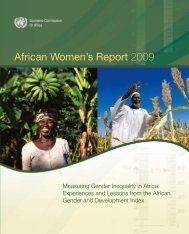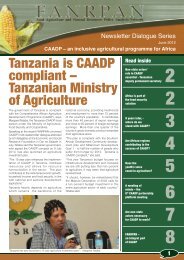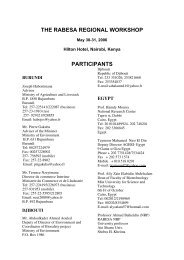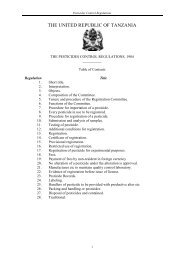Community-driven development decision tools for rural - IFAD
Community-driven development decision tools for rural - IFAD
Community-driven development decision tools for rural - IFAD
- No tags were found...
You also want an ePaper? Increase the reach of your titles
YUMPU automatically turns print PDFs into web optimized ePapers that Google loves.
Managing CDD projectsXIMost common difficultiesTable 4 highlights some of the difficulties experienced in implementing <strong>IFAD</strong>’s CDD approach.Table 4Most common difficulties in implementing <strong>IFAD</strong>’s CDD approachDifficultyPossible causesPossible remedyCentral government officers do notshare the CDD approach andobjectivesRelationships and roles <strong>for</strong> communityand district levels of governance arenot clarified at appraisalLocal authorities create obstaclesto the CBOs playing the roleenvisaged <strong>for</strong> themProcedures are too cumbersome<strong>for</strong> CBOs to get involvedInadequate institutionalassessment;Approved by government withoutappreciating how different it iscompared with conventionalprojectsLocal governments not involved inproject <strong>for</strong>mulation and appraisalProcedural impediments to CDDare not identified, discussed andremedied from the outsetUnify management of the differentstages of the project cycle;Improve communication, policydialogue and training of governmentIntensify dialogue with localgovernment;Establish good relations withpotential opponentsPrepare implementation manualsbe<strong>for</strong>e appraisal and in aparticipatory mannerProject animators limit PRA to onestep soliciting community prioritiesonly; fail to help CBO institutional<strong>development</strong>Poor training of animators;Inadequate resources <strong>for</strong>animation service;Failure to specify objectives ofcontracts with service providersImprove allocation <strong>for</strong> trainingof animators;Link service providers’remuneration to impact ratherthan outcomesPCUs prefer to negotiate with largecontractors, lump subprojects in bigtenders and exclude micro communitylevelenterprisesProject staff do not involve the CBOs’MC in the implementation of theirmicroprojectsFunds <strong>for</strong> training the CBOs areinadequate and participatory M&E issidelinedVillage meetings of “self-evaluation”are seldom held or focus only onphysical targetsProject supervisors concerned by slowdisbursement accept short cuts onCDD objectivesMatters not raised at appraisal andnot negotiated with government;PCUs underestimate the costs ofadministering a large number ofcontracts in a participatory way;The capacity-building dimension isignoredInsufficient allocations to M&E;“Poor disbursement” syndrome ofproject supervisorsA realistic assessment of the cost ofcontracting and supervising at thecommunity level;Distinguish purely administrativeaspects and training functionsRevisit system of incentives <strong>for</strong>project management and theirsupervisors;Emphasize third-level results andCDD objectivesCentral banks introduce managementstandards <strong>for</strong> microfinance institutions(MFIs) that constrain <strong>development</strong> ofcommunity-level MFIs and reserve thefield <strong>for</strong> organizations external to thecommunitiesRural financial services componentsare prepared in isolation fromfinancial authorities;Project supervisors do not follow upon policy dialogue issuesInclude policy dialogue on MFIs andCbanks in all stages of the projectcycle;Ensure that central bankrepresentatives participate in loannegotiationsMid-term reviews (MTRs) areconcerned about slow progress inimproving livelihoods and recommendabandoning the project approach andfocusing on service providers ratherthan on CBOsFailure to intervene be<strong>for</strong>e MTRs;<strong>IFAD</strong>’s Cooperating Institution (CI) orcofinanciers are not sharing CDDapproach;Possible change in government’s ordonor’s attitudeClarify approach from the outset;Formalize commitment ofgovernment, cofinanciers and CI.77
















